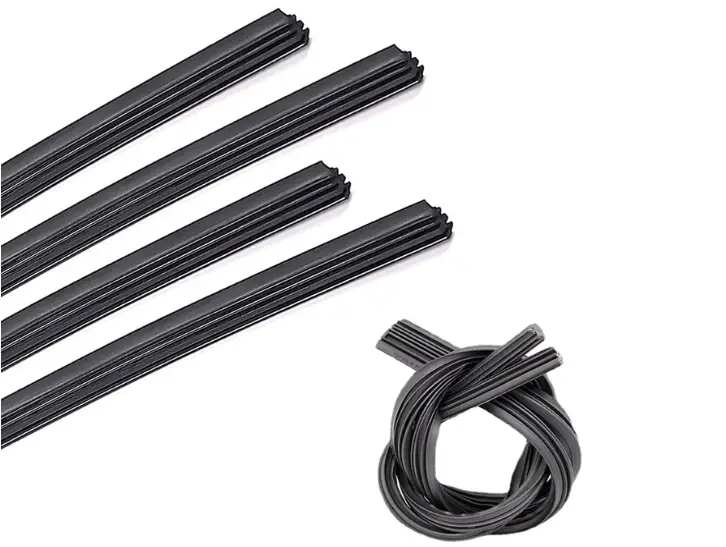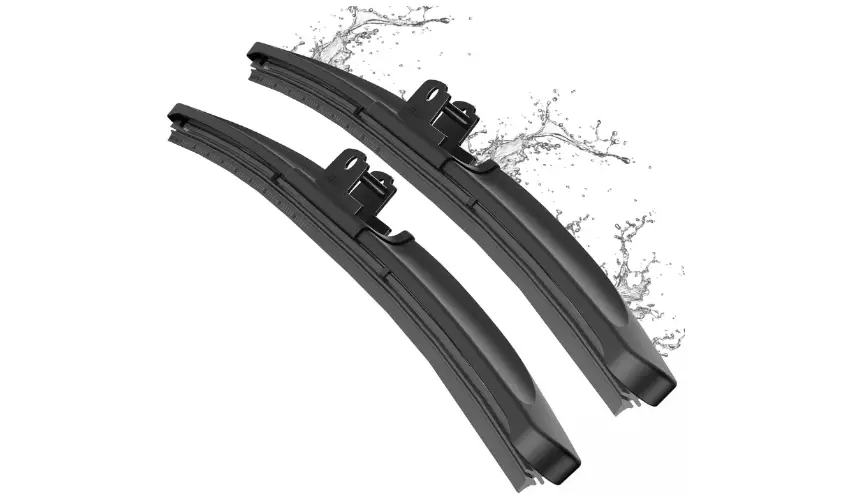When it comes to maintaining a clear view on the road, windshield wipers play a crucial role. They ensure that rain, snow, and debris do not obstruct your vision while driving. While the most common choice for windshield wipers has historically been rubber, silicone wipers have emerged as a popular alternative.
In this blog post, we’ll delve into the differences between silicone and rubber windshield wipers, comparing their advantages, disadvantages, and suitability for various driving conditions. By the end of this post, you will have a clearer understanding of which type of wiper might be the best choice for your vehicle.
Contents
Windshield Wiper Materials
Windshield wipers are designed to clear rain, snow, and debris from your windshield, ensuring that the driver maintains a clear line of sight. The efficiency of wipers largely depends on the material they are made from, which affects their performance, durability, and maintenance.
Rubber Windshield Wipers
Rubber wipers are the traditional choice for windshield wipers. They are made from synthetic rubber compounds designed to withstand weather conditions and provide a decent level of performance. Typically, these wipers are less expensive and more widely available than their silicone counterparts. However, they do have some limitations, particularly in terms of durability and performance over time.

Silicone Windshield Wipers
Silicone wipers, on the other hand, are a newer innovation in the wiper market. These wipers are made from silicone rubber, which offers several advantages over traditional rubber. While they are generally more expensive, their longevity and performance make them an appealing option for many drivers.

Key Differences Between Silicone vs Rubber Windshield Wipers
To help you better understand the differences between these two materials, let’s break down some of the key factors to consider when choosing between silicone and rubber windshield wipers.
| Feature | Silicone Windshield Wipers | Rubber Windshield Wipers |
|---|---|---|
| Durability | Longer lifespan (2-3 years on average) | Shorter lifespan (6 months to 1 year on average) |
| Weather Resistance | Excellent resistance to extreme temperatures | Prone to hardening and cracking in extreme heat |
| Performance | Superior performance in rain and snow | Good performance, but may streak over time |
| Noise Level | Generally quieter during operation | May produce noise or chatter in some conditions |
| Cost | Higher initial cost | Lower initial cost |
| Ease of Installation | Similar installation process | Similar installation process |
| Eco-friendliness | Generally more environmentally friendly | Less eco-friendly, especially with certain compounds |
| UV Resistance | Superior UV resistance | Prone to degradation from UV exposure |
1. Durability
Silicone wipers are designed to last longer than traditional rubber wipers. They typically have a lifespan of 2 to 3 years, making them a more cost-effective choice over time despite the higher initial investment. Rubber wipers, on the other hand, usually need to be replaced every 6 months to a year, especially in harsh weather conditions.
2. Weather Resistance
One of the most significant advantages of silicone wipers is their ability to withstand extreme temperatures. They do not harden or crack as easily as rubber in high heat or cold. This makes them particularly useful in regions with extreme weather conditions. In contrast, rubber wipers are more susceptible to damage from harsh elements.
3. Performance
In terms of performance, silicone wipers tend to offer a smoother, streak-free wipe. They are designed to glide smoothly over the windshield, ensuring maximum visibility in adverse conditions. Rubber wipers can perform well initially but may start to streak as they wear down, particularly if they are not replaced regularly.
4. Noise Level
Silicone wipers are generally quieter during operation, creating less noise when in use. Rubber wipers may produce more noise due to their tendency to skip or chatter, especially if they are not properly maintained.
5. Cost
While silicone wipers have a higher initial cost (ranging from $20 to $30 per pair), their durability often makes them more cost-effective over time. Rubber wipers typically range from $10 to $20 per pair, but their shorter lifespan means you will need to replace them more frequently, leading to higher costs in the long run.
6. Eco-friendliness
Silicone wipers are often marketed as more environmentally friendly because they do not contain certain harmful chemicals found in some rubber compounds. Additionally, their longer lifespan means less waste generated from frequent replacements.
7. UV Resistance
Silicone wipers have superior UV resistance compared to rubber wipers. Rubber can degrade and become brittle when exposed to sunlight for extended periods, leading to decreased performance and a need for replacement. Silicone wipers maintain their flexibility and effectiveness under UV exposure, making them a better option for sunny climates.
Pros and Cons of Silicone Windshield Wipers
Silicone windshield wipers are becoming a popular alternative to traditional rubber wipers due to their improved durability and performance. Like any product, they come with both advantages and disadvantages. Here’s a breakdown of the pros and cons of silicone windshield wipers:
Pros
Here are some notable pros of silicone windshield wipers –
- Longer Lifespan: Silicone wipers can last up to three times longer than rubber wipers.
- Streak-Free Performance: They provide a smoother, quieter wipe, ensuring clear visibility.
- Extreme Weather Resistance: Silicone wipers are less affected by extreme temperatures.
- Eco-Friendly: Generally made without harmful chemicals, they are better for the environment.
Cons
Here are some notable cons of silicone windshield wipers –
- Higher Cost: The initial price is higher than that of rubber wipers.
- Less Widely Available: Silicone wipers may not be as easily found in all auto parts stores.
Pros and Cons of Rubber Windshield Wipers
Rubber windshield wipers are the standard option found on most vehicles, providing effective windshield cleaning at an affordable price. However, they come with certain limitations, especially in extreme weather conditions. Here’s a look at the pros and cons of rubber windshield wipers:
Pros
Here are some notable pros of rubber windshield wipers –
- Lower Initial Cost: Rubber wipers are less expensive to purchase.
- Widely Available: They are commonly found in most auto parts stores.
Cons
Here are some notable cons of rubber windshield wipers –
- Shorter Lifespan: They need to be replaced more frequently.
- Performance Degradation: Rubber wipers can streak and chatter over time.
- Less Weather Resistant: Prone to cracking and hardening in extreme temperatures.
Which Type of Wiper Should You Choose?
Choosing between silicone and rubber windshield wipers ultimately depends on your specific needs and driving conditions. Here are some factors to consider:
- Climate: If you live in an area with extreme temperatures, silicone wipers may be the better option due to their durability and performance.
- Frequency of Use: If you drive frequently in inclement weather, investing in silicone wipers could provide better visibility and safety.
- Budget: If you’re on a tight budget, rubber wipers may be more appealing initially. However, consider the long-term costs of replacement.
- Environmental Concerns: If eco-friendliness is a priority for you, silicone wipers may be the way to go.
Frequently Asked Questions
Here are some FAQs about silicone windshield wipers vs rubber –
1. How often should I replace my windshield wipers?
It is generally recommended to replace windshield wipers every 6 months to a year for rubber wipers and every 2 to 3 years for silicone wipers. However, regular inspection is crucial, as wear and tear can vary based on climate and usage.
2. Are silicone wipers worth the extra cost?
Yes, silicone wipers tend to last longer and perform better than rubber wipers, making them a cost-effective option over time, especially if you frequently drive in adverse weather conditions.
3. Can I use silicone wipers in winter conditions?
Absolutely! Silicone wipers perform well in winter conditions, providing a smooth wipe and resisting damage from cold temperatures.
4. Are there any specific maintenance tips for windshield wipers?
To extend the life of your windshield wipers, clean the blades regularly to remove dirt and debris. Additionally, ensure your windshield is clean and free of ice or snow before using the wipers.
5. How do I know when to replace my wipers?
Signs that it’s time to replace your wipers include streaking, skipping, or chattering during operation, as well as visible wear such as cracks or tears in the rubber or silicone material.
Conclusion
In summary, both silicone and rubber windshield wipers have their advantages and disadvantages. Silicone wipers provide superior performance, durability, and eco-friendliness, making them a great investment for drivers who prioritize safety and long-term cost-effectiveness. On the other hand, rubber wipers are a budget-friendly option that can still perform adequately for those who drive less frequently or in milder climates.